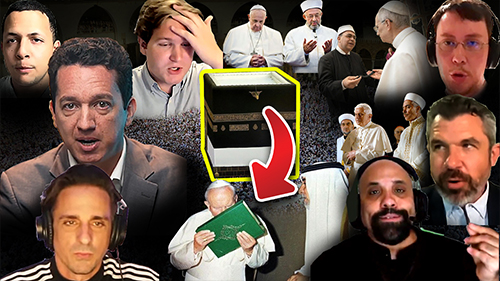| Recent Featured Videos and Articles | Eastern “Orthodoxy” Refuted | How To Avoid Sin | The Antichrist Identified! | What Fake Christians Get Wrong About Ephesians | Why So Many Can't Believe | “Magicians” Prove A Spiritual World Exists | Amazing Evidence For God | News Links |
| Vatican II “Catholic” Church Exposed | Steps To Convert | Outside The Church There Is No Salvation | E-Exchanges | The Holy Rosary | Padre Pio | Traditional Catholic Issues And Groups | Help Save Souls: Donate |  |









 " />
" /> " />
" /> " />
" /> " />
" /> " />
" />




The Errors of Michael Du Bay
OBJECTION- Wasn’t the idea that catechumens cannot have the remission of sins condemned in the Errors of Michael Du Bay?
ANSWER- No! And the fact that certain baptism of desire advocates obstinately attempt to quote the Errors of Michael Du Bay in favor of baptism of desire simply shows: 1) their dishonesty; and 2) their lack of evidence for “baptism of desire.”
Michael Du Bay’s propositions above are condemned because they assert that perfect charity can be in catechumens and penitents without the remission of sins. (Note: this says nothing one way or the other about whether or not perfect charity can be in catechumens with the remission of sins.) Du Bay’s propositions above are false because one cannot have perfect charity without the remission of sins.
Faith, hope, charity and the remission of sins are inseparable in a justified person. Thus, Michael Du Bay was rightly condemned for his false statement that catechumens and penitents can have perfect charity without the remission of sins. His assertion contradicts Catholic teaching. And when a pope condemns propositions like the false propositions of Michael Du Bay, he condemns the entire proposition as such. In condemning such an error, no assertion is made positively or negatively about either part of the statement, nor is any assertion made, positively or negatively, about whether catechumens can have remission of sins with perfect charity, which is not the topic of Michael Du Bay’s statement. But we know from other teachings that unbaptized catechumens cannot have the remission of sins at all since they are outside the Church.
A good example which further serves to show how the baptism of desire advocates are completely wrong in using Michael Du Bay as an argument for “baptism of desire” is found Denz. 646, an error of John Hus, condemned by the Council of Constance:
Based on this passage, some people have erroneously concluded that the argument of sedevacantists (that a pope who becomes a heretic loses his office and ceases to be head of the Church since he is not a member of it) is condemned here. But the Council of Constance is not condemning that at all; it is not asserting anything one way or the other in that regard. Rather, it is condemning the entire proposition as such, which asserts that because a pope is wicked (or immoral) he is not the head of the Church since he is not a member of it. And this is false: just because a pope is wicked does not mean that he is not a member of the Church and therefore he is not the head of the Church. The sedevacantists, on the other hand, correctly point out that a heretical pope (not merely a wicked one) is not a member of the Church and therefore cannot be the head of the Church (and thus he loses his office automatically when he becomes a heretic). This is actually the teaching of the Church.
Therefore….
Thus, as we can see, the second half of John Hus’s condemned statement, “[a pope] is not the head of the holy militant Church, since he is not a member of it,” is true. But Hus’s proposition is condemned as it is because in the beginning it asserted that this cessation of membership (and therefore headship) comes about from simply being a wicked pope, which is false. Thus, taken as a whole, Hus’s proposition, like Du Bay’s, is false and therefore it was condemned.
So, the error of John Hus is a valuable example in demonstrating that the baptism of desire advocates are completely wrong again in citing the errors of Michael Du Bay as an argument. In condemning such a proposition from Michael Du Bay, the pope makes no statement positively or negatively about whether catechumens can have remission of sins with perfect charity, because that was not what Du Bay asserted. The fact is that catechumens cannot have remission of sins at all because they are outside the Church.
But the baptism of desire advocates know that the Errors of Michael Du Bay don’t prove their point or they could figure that out if they tried, so why do some of them keep using this non-argument as an argument? It’s simply dishonesty! It is actually an outrage that they obstinately try to play upon the laypeople’s ignorance by using these errors of Michael Du Bay as an argument in favor of baptism of desire. The dishonest CMRI out of Spokane, Washington, for example, recently published a pamphlet and an article on baptism of desire. The pamphlet and the article not only totally misquoted the Council of Trent’s teaching in Sess. 6, Chap. 4 (using “except through” instead of “without”), but quite dishonestly used the above errors of Michael Du Bay as a “proof” for baptism of desire. In using these tactics in their pamphlet and article, the CMRI deceived their readers who don’t care enough about the Faith to examine the issue carefully and weigh the merits of their argument – those readers who simply believed what the CMRI concluded because it seemed documented, which is probably a great number. This is how heretics kill souls and lead them astray.
[1] Denzinger 1031.
[2] Denzinger 1033.
[3] Denzinger 799-800.
[4] Denzinger 468-469.
[5] Denzinger 646.
[6] Denzinger 423.
[7] St. Francis De Sales, The Catholic Controversy, pp. 305-306
[8] The Papal Encyclicals, Vol. 2 (1878-1903), p. 401.
Sign up for our free e-mail list to see future vaticancatholic.com videos and articles.
Recent Content
^